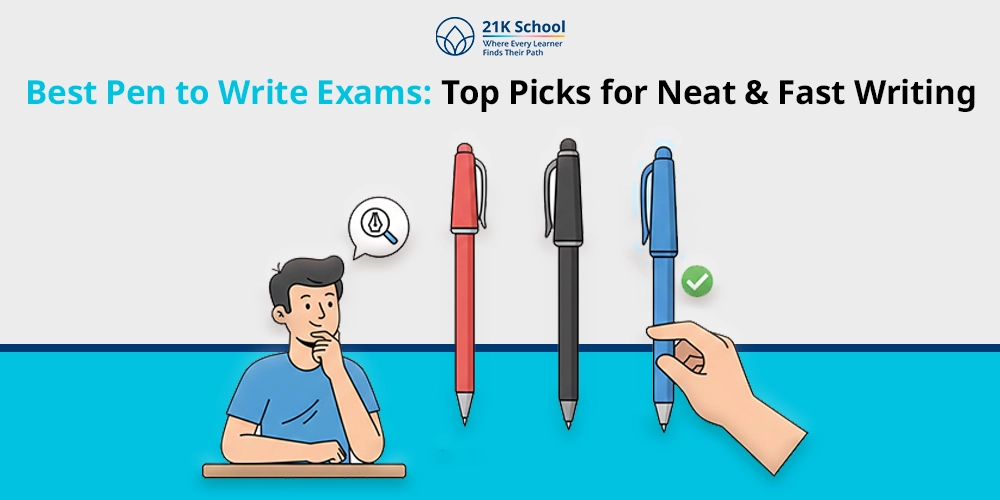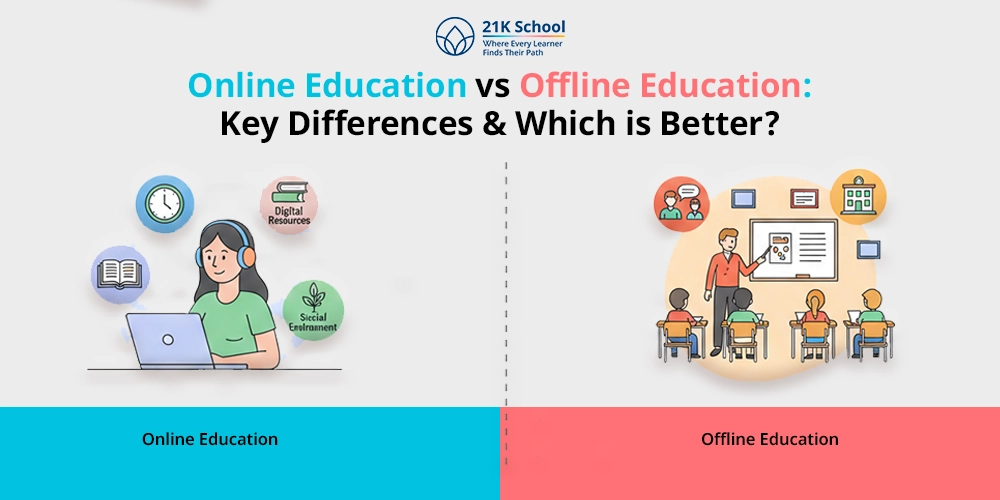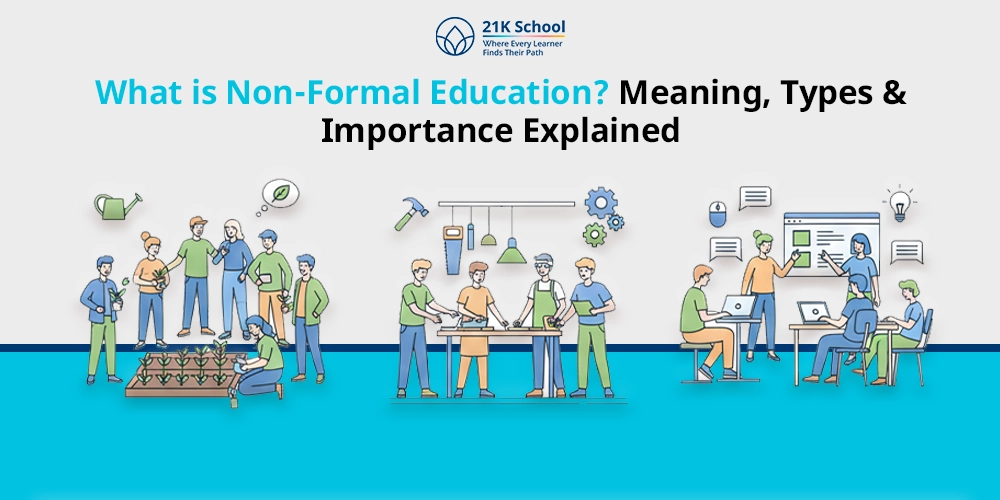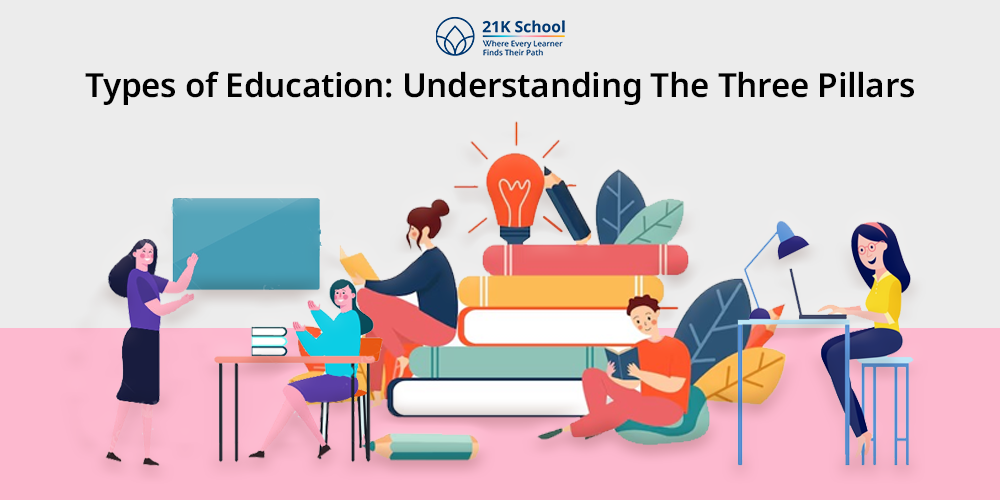
We spend most of our time in education but have you thought about how we learn? When you think about learning or education what comes to mind.
A classroom, textbooks, teachers or students. Education is a huge part of our everyday life no matter whether you are a teacher, student or parent. Understand the importance of education in today’s era.
Education is a fundamental part of human development which helps in shaping people and societies together. This is done by acquiring knowledge, skills, values and habits.
To get a diverse range of learning experiences students need to understand dynamic education first.
Contents
What is Education?
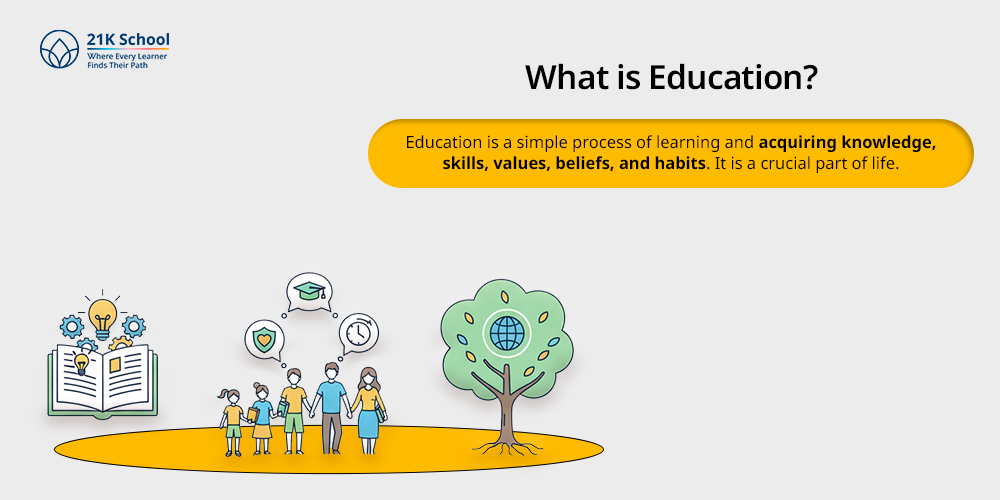
Education is a simple process of learning and acquiring knowledge, skills, values, beliefs, and habits. It is a crucial part of life.
Education consists of formal and non-formal, informal instruction, and can be gained in various places. Places like schools, universities, workplaces, and through personal experiences.
In simple words, education is all about the development of a person to their fullest potential and contributing to the betterment of society.
To know more about education let’s understand the various types of education In more detailed way.
Types of Education
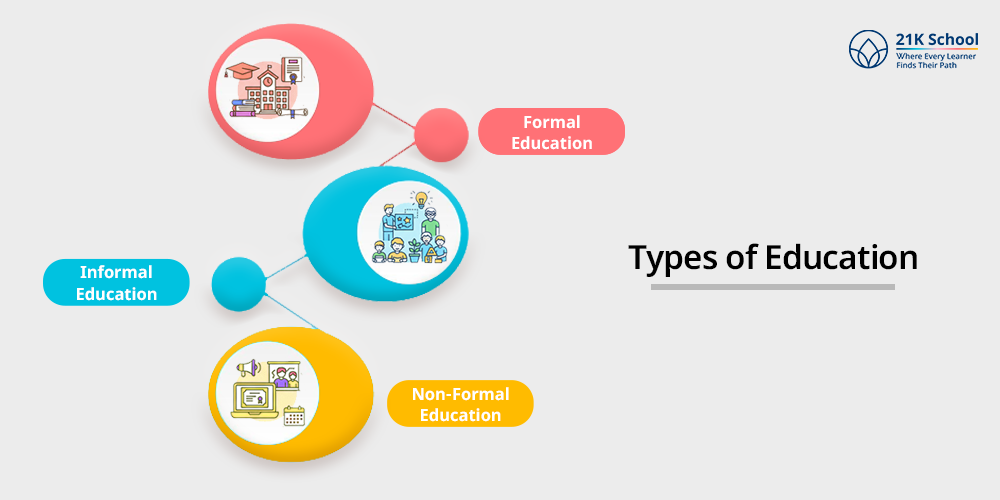
Education is crucial and it can be structured or unstructured, intentional or accidental. To understand education in a better way we need to understand its types.
Education can be classified into three main types such as:
- Formal Education
- Informal Education
- Non-Formal Education
Each type of education has unique features, methods, and results. However, they all help an individual’s overall learning journey throughout life.
Further we will know more about each type one by one to understand which is better for your kid. You can also explore various educational activities for kids .
Formal Education
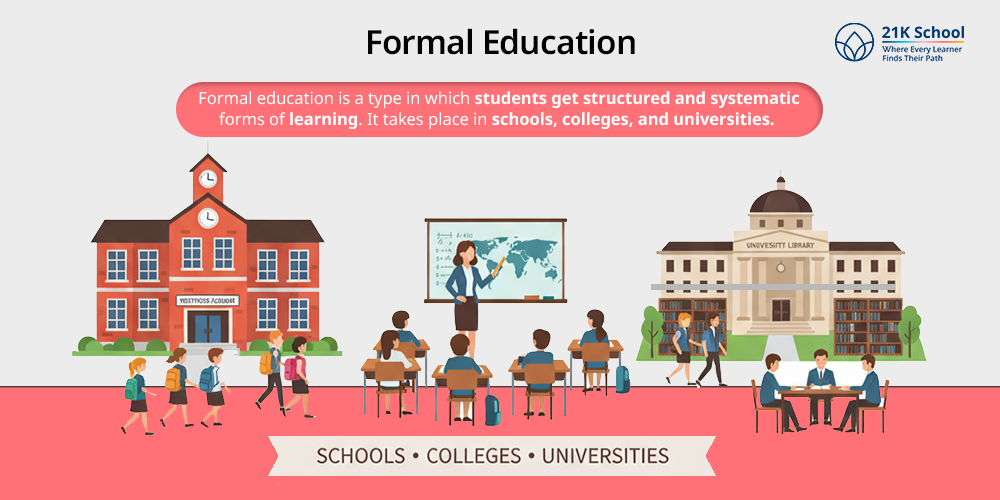
Formal education is a type in which students get structured and systematic forms of learning. It takes place in schools, colleges, and universities.
In this type, schools follow a particular curriculum which is governed by strict rules and regulations. In the end students get certifications or degrees!
Characteristics of Formal Education
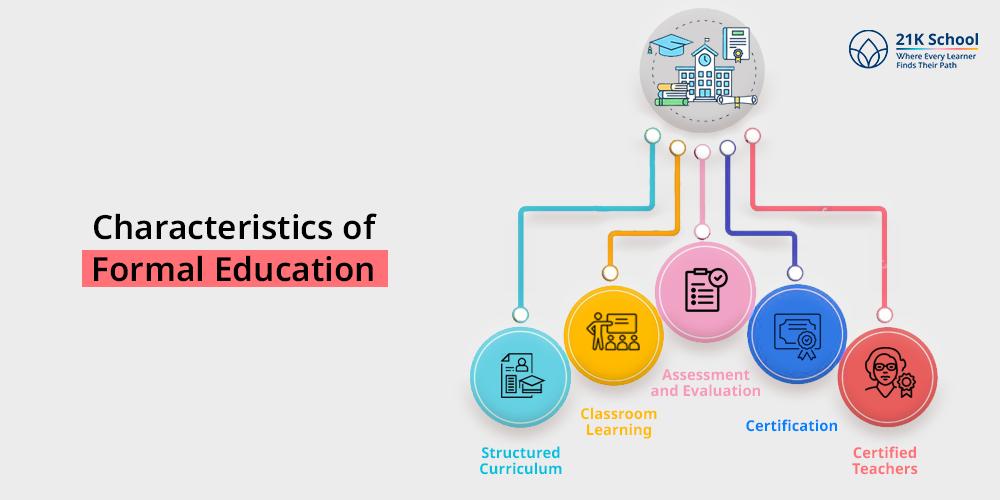
1. Structured Curriculum
Formal education takes place in a school or dedicated learning place which provides a structured curriculum.
If you are looking for an ideal education, look at the best way to choose the right curriculum for your child .
It represents what students will learn and how it will be taught in each class.
2. Classroom Learning
As we know, formal education primarily takes place in a classroom setting which makes it unique then other types of education.
Students often connect with teachers and administration who make the learning process easy and engaging.
3. Assessment and Evaluation
Assessment and evaluation are crucial for formal education. This includes exams, assignments, and grades to evaluate progress etc.
4. Certification
After completion, students receive diplomas, degrees, or other credentials upon completion.
5. Certified Teachers
Formal education is popular for providing systematic education.
With the help of certified teachers who have the qualifications in their respective fields students can achieve academic success.
Informal Education
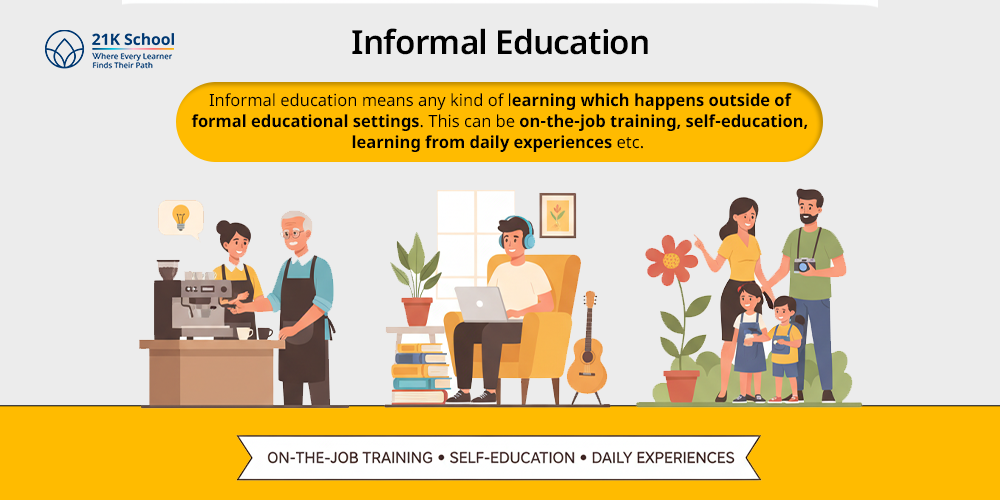
Informal education means any kind of learning which happens outside of formal educational settings.
This can be on-the-job training, self-education, learning from daily experiences etc. Here the learner doesn’t have a structured, curriculum-based environment.
Informal education is a lifelong learning process in which individuals acquire knowledge, skills, attitudes, and values from various sources and situations.
Characteristics of Informal Education
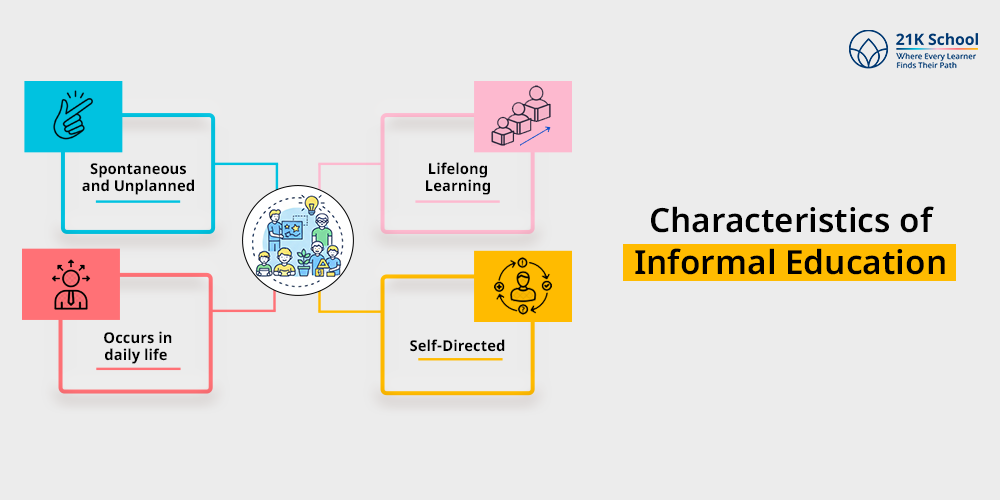
1. Spontaneous and Unplanned
Informal learning occurs without any structured curriculum or schedule. This kind of learning happens through life experiences.
2. Lifelong Learning
Informal education is a lifelong learning process which can happen at any age and in various contexts.
3. Self-Directed
This type of person takes initiative to learn and explore various topics based on their interest.
4. Occurs in daily life
Informal education occurs in kids’ daily life works. Takes place in various settings such as at home, at work, or in the community.
Non-Formal Education
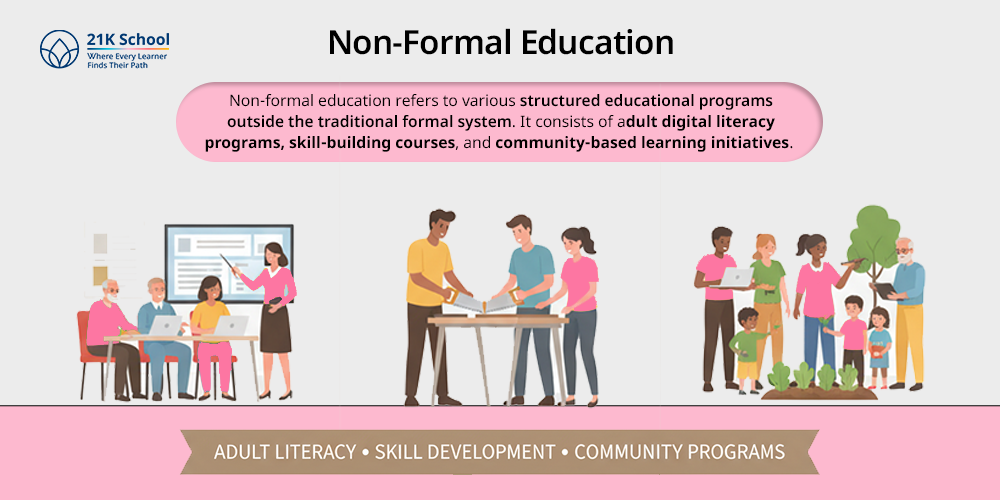
Non-formal education refers to various structured educational programs outside the traditional formal system. It is designed to provide learning opportunities for adults and youth.
It consists of adult digital literacy programs, skill-building courses, and community-based learning initiatives.
These programs often prioritize practical skills, real-life applications, and active participation. It has a flexible and accessible format which makes it an ideal choice.
Characteristics of Non-Formal Education
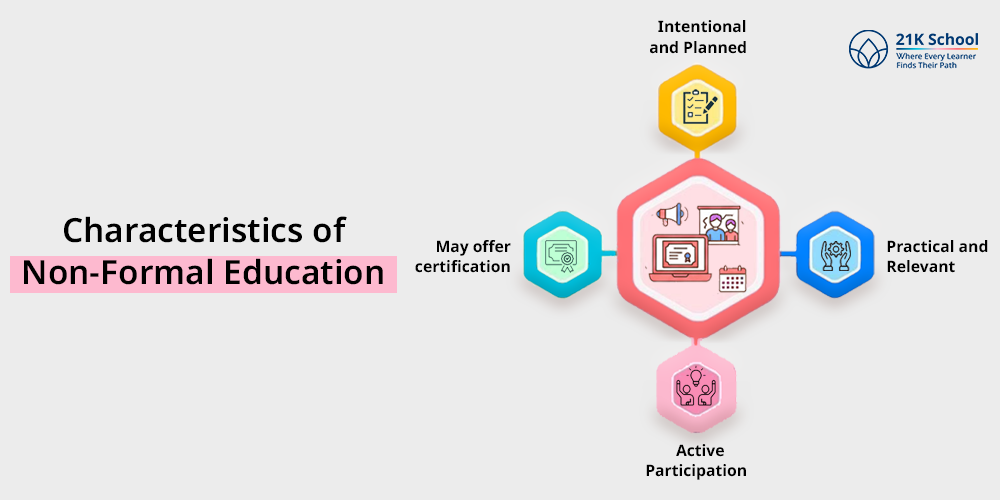
1. Intentional and Planned
Same as formal education, non-formal education is also intentional or planned learning. It is a deliberate, organized and purposeful attempt to facilitate learning.
2. Practical and Relevant
Non-formal learning includes practical skills and real-world applications for gaining knowledge. This makes learning more relevant to the learner’s lives.
3. Active Participation
Non-formal education helps kids in active participation and engagement in the learning process .
This means kids are motivated to engage, collaborate, and contribute their ideas during meetings or group discussions.
4. May offer certification
Sometimes students get participation certificates or skills in non-formal education but mostly it is not equivalent to formal degrees.
Formal Education Vs. Informal Education Vs. Non-Formal Education- Quick Differentiation
Formal, informal, and non-formal education are different from each other based on types of activities, course content, outcomes, and other points. Here is a quick elaboration of Formal Education vs. informal education vs non-formal education through table below:
| SNo. | Particulars | Formal | Informal | Non-formal |
| 1. | Definition | Formal education is structured, institutionalized education with a curriculum and certification. | Informal education is unstructured, spontaneous learning from daily experiences. | Non-formal is an organized learning outside formal systems; often skill-based and flexible. |
| 2. | Instance | School, college, university, professional degree programs. | Learning from parents, peers, media, life experiences. | Adult literacy programs, vocational training, community workshops, online courses. |
| 3. | Type of Activities | Activities like classroom teaching, exams, assignments, projects. | Activities such as conversations, observations, hobbies, self-study. | Various activities includes workshops, training sessions, seminars, practical demonstrations. |
| 4. | Course Content | Course content is a predefined syllabus approved by education authorities. | No fixed course content available. It depends on the situation and learner interest. | Course content is designed while focusing on specific skills or knowledge areas. |
| 5. | Outcomes | Academic qualifications, degrees, diplomas. | Personal development, social skills, life lessons. | Skill acquisition, certificates of participation, practical competencies |
| 6. | Source of Acquiring Knowledge | Educational institutions, certified teachers. | Family, society, media, environment. | NGOs, training centers, online platforms, community organizations. |
| 7. | Ways of Acquiring Knowledge | Systematic instruction, formal assessments. | Observation, imitation, trial and error, discussions. | Interactive learning, hands-on practice, flexible assessments. |
| 8. | Advantages | Advantages of formal education such as recognized qualifications, structured progression, career opportunities. | Common advantages are flexible, free, lifelong, adaptive to real-life situations. | Accessible, targeted learning, practical application, lifelong learning are primary advantages of non-formal education. |
| 9. | Disadvantages | Disadvantages include being expensive, rigid, exam-oriented, time-consuming. | Informal education lacks certification, inconsistent, hard to measure progress. | Limited recognition, variable quality, and lack of depth are some common disadvantages of non-formal education. |
Examples of Formal Education
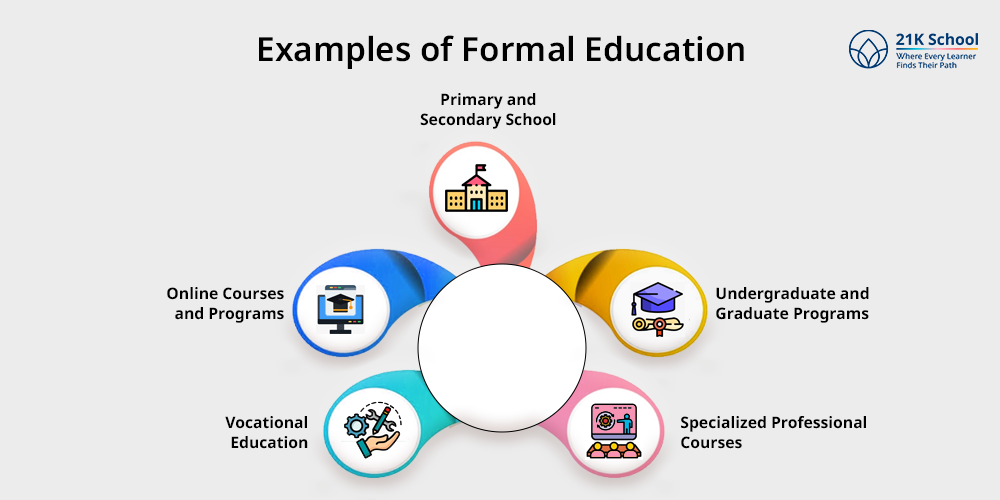
1. Primary and Secondary School
In primary and secondary school kids explore fundamental skills and subjects.
2. Undergraduate and Graduate Programs
It starts by pursuing bachelor’s, master’s, and doctoral degrees in interested disciplines at universities.
3. Specialized Professional Courses
Professional courses such as engineering, medicine, or law in which students can enroll.
4. Vocational Education
Vocational education means programs tailored to prepare students for specific trades or professions.
5. Online Courses and Programs
With time online courses and programs trend become normal. There are many universities and institutions that offer this kind of formal education.
Advantages of Formal Education
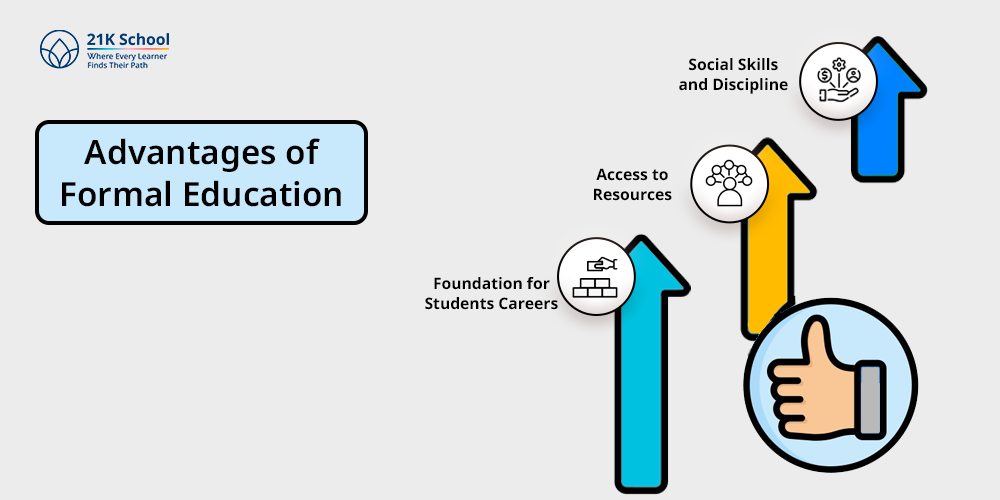
1. Foundation for Students Careers
Formal education is a foundation for students’ careers growth and development. It helps them to prepare for specific professions through structured learning techniques.
2. Social Skills and Discipline
Development of social skills and discipline are some good reasons why parents choose formal education.
It motivates students for teamwork, time management , and personal responsibility.
3. Access to Resources
Formal education leads to enhanced knowledge acquisition, career opportunities, and social mobility.
Now students can access libraries, laboratories, sports facilities, expert faculties and many more.
Disadvantages of Formal Education
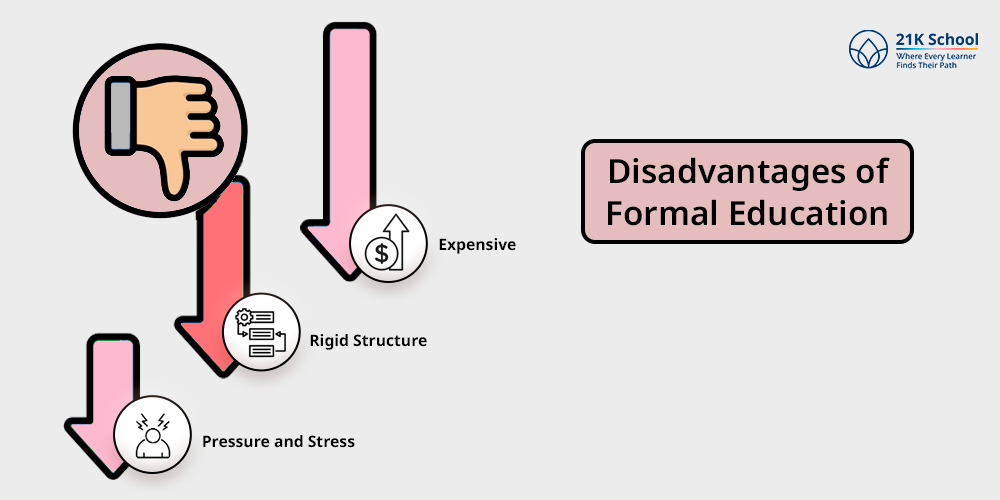
1. Expensive
One of the primary disadvantages of formal education is high tuition fees, books, uniforms and living expenses.
This can be a burden for many families which leads to student debt, limiting future financial opportunities and career choices.
2. Rigid Structure
Due to fixed schedules and curricula in formal education students deal with rigid structure.
This may not suit every learner’s pace or interest which leads to lack of creativity, excessive pressure for grades, and potentially wasted time.
3. Pressure and Stress
Formal education leads to pressure and stress due to competitive exams, deadlines, and performance expectations etc.
This can cause anxiety, disengagement and a lack of motivation. As a parent, I understand the problems with physical education in schools .
Examples of Informal Education
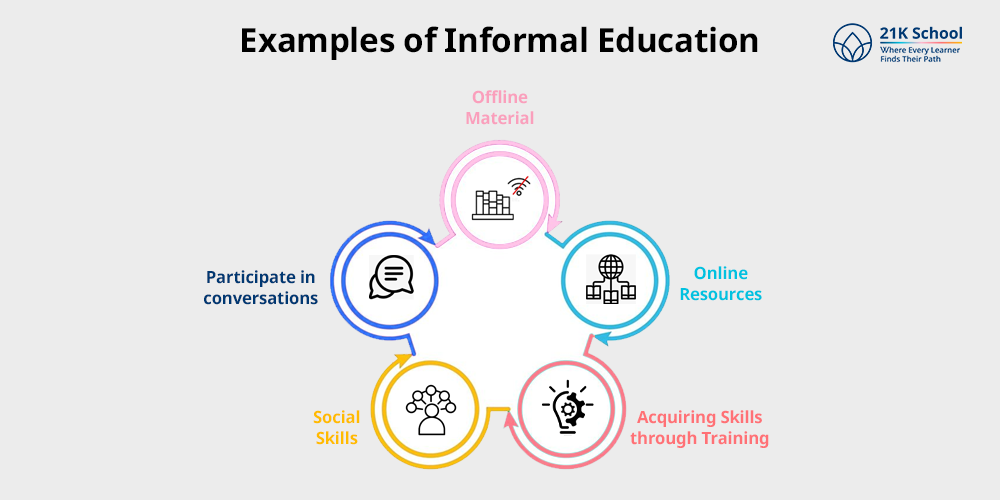
1. Offline Material
Offline material such as reading new books , watching videos for learning, or playing educational games are common approaches to informal education.
2. Online Resources
Taking knowledge from online resources, such as free or paid websites, blogs or YouTube channels.
3. Participate in conversations
Kids in informal education participate in conversations and discussions with others and clear doubts.
4. Acquiring Skills through Training
Acquiring skill based education through on-the-job training to gain enough knowledge.
5. Social Skills
Kids can develop a variety of social skills through sports or clubs.
Advantages of Informal Education
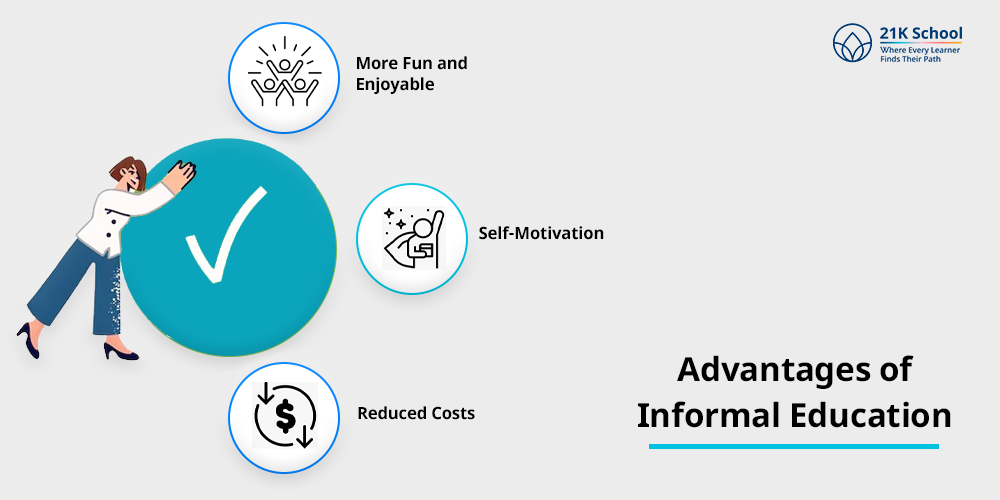
1. More Fun and Enjoyable
As compared to formal, informal learning is more fun and enjoyable experience. Because it starts and ends with personal interests and passions.
2. Self-Motivation
For deeper understanding of the subject matter kids choose the desired ones which creates self-motivation while learning.
3. Reduced Costs
As per research, formal education is more expensive than informal education. Here kids can access various already available resources like the internet and online platforms.
For example: best websites for learning coding .
Disadvantages of Informal Education
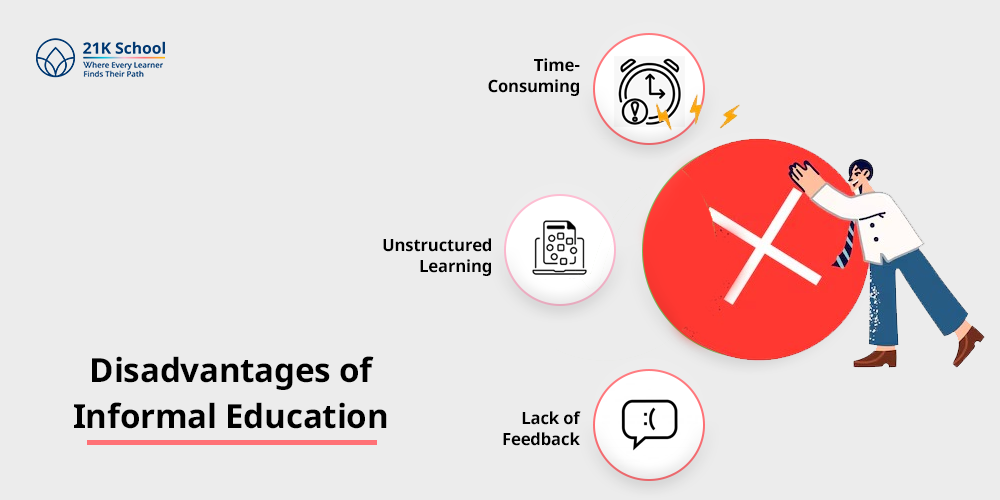
1. Time-Consuming
Informal education is a time consuming process because it doesn’t have any set schedules and deadlines. It requires more self-directed effort, potentially leading to increased time commitment.
2. Unstructured Learning
Informal education includes unstructured learning means absence of a structured curriculum or accurace results just like formal education .
This can be a challenging type of education to ensure that learning is comprehensive and meets specific objectives.
3. Lack of Feedback
Formal learning and assessment has feedback mechanisms which makes it easier to understand and implement accordingly.
However, informal lack of feedback can be seen which makes it difficult to gauge progress and identify areas for improvement.
Examples of Non-Formal Education
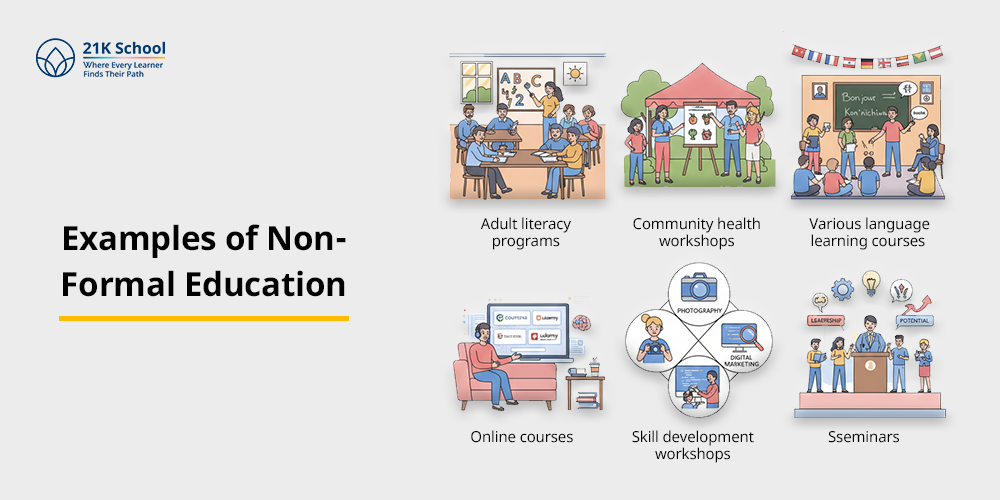
1. Adult literacy programs provided by government, educational institutions, NGOs, and other social agencies.
2. Community health education workshops.
3. Various language learning courses at cultural centers.
4. Online courses such as Coursera, Udemy, or Khan Academy.
5. Skill development workshops like photography, coding and web development, digital marketing etc.
6. Leadership or personal development seminars.
Advantages of Non-Formal Education
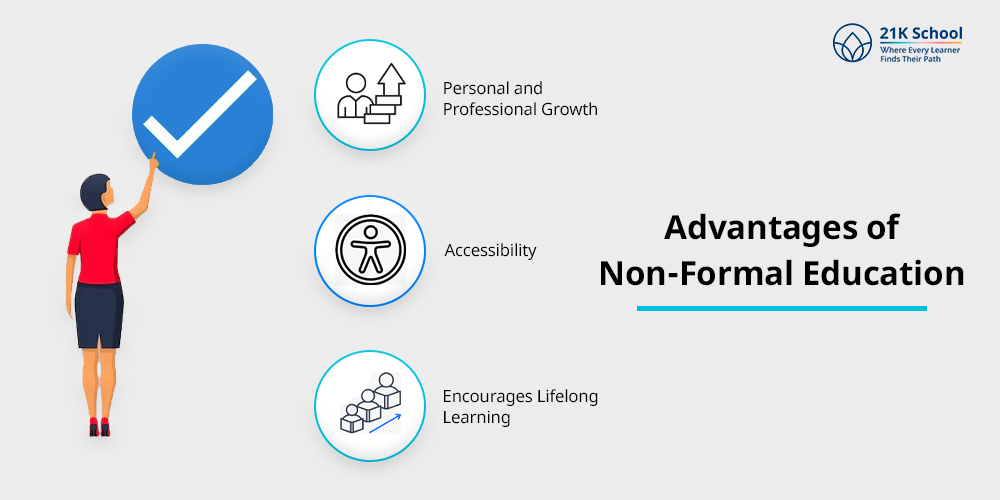
1. Personal and Professional Growth
Non-formal education helps in both professional and personal development .
Due to its voluntary nature, learners can adapt based on their own interests and needs.
2. Accessibility
One of the essential advantages of non-formal education is accessibility.
This type of education is more flexible, adapts to individual needs and paces, and can be delivered in various locations and formats.
3. Encourages Lifelong Learning
Non-formal education encourages lifelong learning which means it supports continuous personal and professional growth.
Disadvantages of Non-Formal Education
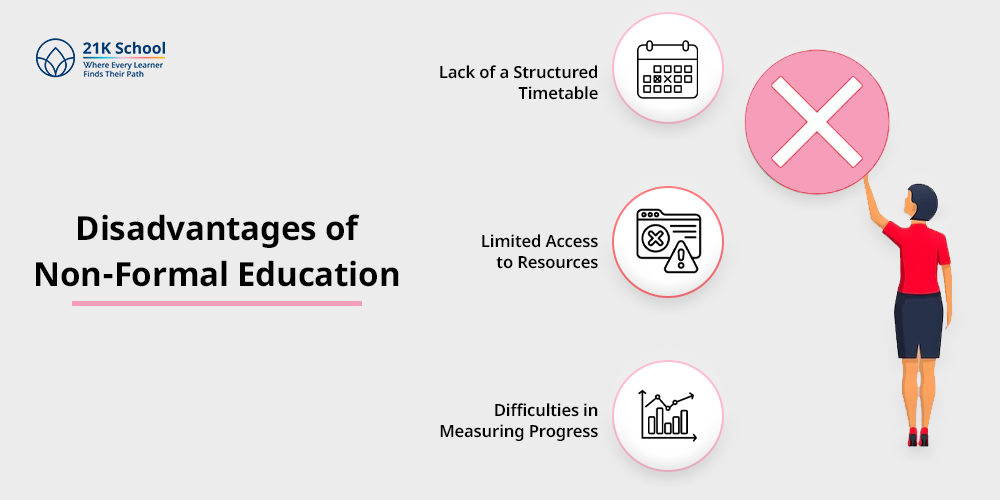
1. Lack of a Structured Timetable
Unlike formal learning, non-formal learning often lacks a clear schedule or timetable.
It can make learning difficult for kids to stay on track and achieve the daily objectives.
2. Limited Access to Resources
Non-formal learning often lacks access to the extensive resources available in formal education.
However, individuals can access online material but are unable to access libraries, laboratories, or specialized equipment.
3. Difficulties in Measuring Progress
Learners have difficulties in measuring progress effectively in non-formal learning programs.
It happens due to factors such as its flexible nature, lack of standardized curricula, and voluntary participation.
Conclusion
Modern education is not the same for everyone. Formal, informal, and non-formal education each serve unique purposes and together create a holistic learning experience.
It stays together throughout a person’s life. While formal learning lays the groundwork, informal and non-formal learning enrich and expand that foundation in diverse and meaningful ways.
Embracing all three types can foster continuous growth, adaptability, and personal empowerment in a rapidly changing world.
Learn the trends in education
and to know more you must follow 21K School
, a leading destination to build 21st century education.

